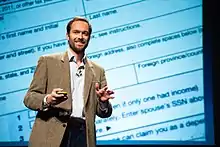Jan-Emmanuel De Neve
Jan-Emmanuel De Neve (born 14 March 1979) is a Belgian economist and professor at the University of Oxford where he directs the Wellbeing Research Centre. De Neve is also the KSI Fellow and Vice-Principal of Harris Manchester College.[1] He is best known for his research on the economics of wellbeing[2][3] which has led to new insights into the relationship between wellbeing and income,[4] productivity,[5][6] economic growth,[7][8] and inequality.[9] De Neve is also an editor of the World Happiness Report.[10]
Jan-Emmanuel De Neve | |
|---|---|
 Jan-Emmanuel De Neve at PopTech conference | |
| Born | 14 March 1979 |
| Nationality | Belgian |
| Institution | University of Oxford |
| School or tradition | Behavioral economics |
| Alma mater | London School of Economics Harvard University |
| Influences | John Kenneth Galbraith Richard Layard |
His research was selected among "The Management Ideas that Mattered Most" by Harvard Business Review[11] and he was awarded the Ruut Veenhoven Award by Erasmus Universiteit of Rotterdam for his contributions to the scientific study of happiness.[12]
De Neve collaborated with the Ministry of Finance in Belgium to apply behavioral insights to tax compliance. Media reports on an intervention to rework the tax reminder letters noted that the experiment boosted tax compliance by 18.6 million euros with a reduction of 1 million euros in administrative costs.[13][14]
In May 2020, in an interview with Flemish TV Channel VRT about the COVID-19 pandemic he noted that the economic and mental health consequences of the lockdown disproportionally fall on the younger generations while the health benefits of the lockdown benefit mostly the elderly. His remarks stirred a contentious debate on the need for targeted fiscal stimuli and how to pay for it.[15] De Neve elaborated on this in an interview with Trends Magazine[16] and in pieces for the main Belgian newspapers Le Soir[17] and De Standaard.[18]
References
- "How will humans, by nature social animals, fare when isolated?". www.economist.com. The Economist. 4 April 2020. Retrieved 17 May 2020.CS1 maint: others (link)
- Rahim, Zamira. "Norway Is Happiest Country in the World. What's the Secret?". Time. Retrieved 1 October 2017.
- Morrison, Lennox. "The many upsides of a happy workforce". BBC. Retrieved 1 October 2017.
- Jha, Alok; correspondent, science. "Happy teenagers earn more as adults". The Guardian. ISSN 0261-3077. Retrieved 1 October 2017.
- Bartleby. "Research suggests happy employees are good for firms and investors". The Economist. Retrieved 17 November 2019.
- Lufkin, Bryan. "Just how short could we make the working week?". BBC. Retrieved 23 September 2018.
- Harford, Tim. "Why are recessions so depressing?". Financial Times. Retrieved 21 October 2017.
- Lam, Bourree. "Why Don't Boom-Times Make People Happier?". The Atlantic. Retrieved 21 October 2017.
- "Income Inequality Makes Whole Countries Less Happy". Harvard Business Review. Retrieved 21 October 2017.
- "What The World's Happiest Country Can Teach Us About Surviving The Coronavirus Crisis". www.huffingtonpost.co.uk. Huffington Post. 20 March 2020. Retrieved 17 May 2020.CS1 maint: others (link)
- "The Management Ideas That Mattered Most in 2016". Harvard Business Review. Retrieved 21 October 2017.
- "Ruut Veenhoven Award 2015". www.eur.nl. Erasmus Universiteit Rotterdam. 27 June 2017. Retrieved 21 October 2017.CS1 maint: others (link)
- Experiment By Jan-Emmanuel De Neve Boosts Belgian Tax Compliance By 18.6 Million Euros, The Future Leadership Institute, 16 November 2016.
- "Slimme brief fiscus doet vergeetachtige belastingbetalers snel betalen". www.standaard.be (in Dutch). De Standaard. 31 October 2016. Retrieved 10 June 2020.CS1 maint: others (link)
- "Hoe gaan we de coronacrisis betalen? En vooral: wie gaat dat doen?". www.vrt.be (in Dutch). VRT. 14 May 2020. Retrieved 31 May 2020.CS1 maint: others (link)
- "Econoom Jan-Emmanuel De Neve: 'Economische groei betekent niet meer welzijn'". www.trends.knack.be (in Dutch). Trends Magazine. 11 June 2020. Retrieved 11 June 2020.CS1 maint: others (link)
- "Pour une politique de relance adaptée à toutes les générations". www.lesoir.be (in French). Le Soir. 19 May 2020. Retrieved 31 May 2020.CS1 maint: others (link)
- "Een relancebeleid op maat van alle generaties". www.standaard.be (in Dutch). De Standaard. 19 May 2020. Retrieved 31 May 2020.CS1 maint: others (link)
External links
- Jan-Emmanuel De Neve (home page), University of Oxford
- Wellbeing Research Centre (home page), University of Oxford
- Publications list and academic citations, Google Scholar.
- World Happiness Report.